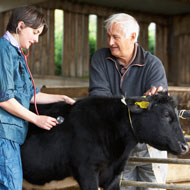Cutting antibiotic use has no adverse affect on cattle health and welfare - study

The growing threat of antimicrobial resistance has put pressure on the livestock industry to reduce its use of antibiotics.
Ceasing the use of certain antibiotics does not have an adverse effect on the health, welfare or production of dairy cows, according to new research.
In the study, researchers collected data from seven dairy farms in North Somerset that had stopped using the ‘highest priority critically important antimicrobials’ (HP-CIAs), as recommended by the World Health Organisation.
The findings, published in Vet Record, suggest that the health and welfare of dairy cattle can be maintained - and even improved - without the use of HP-CIAs. They also indicate that the complete cessation of HP-CIAs can lead to an overall reduction of antibiotic use on dairy farms.
“A cessation of the use of HP-CIAs and a decrease in the use of AMs within the livestock industry should be a key target for farmers and veterinary surgeons and has been shown to be achievable while maintaining animal health, welfare and production,” the authors conclude.
The growing threat of antimicrobial resistance to both human and animal health has put pressure on the livestock industry to reduce its use of antibiotics. In April 2017, the World Health Organisation identified quinolines and third- and fourth- generation cephalosporins as HP-CIAs because of the level of risk to human health.
The study, Ceasing the use of the highest priority critically important antimicrobials does not adversely affect production, health or welfare parameters in dairy cows, was conducted by veterinary researchers at the University of Bristol and the University of Surrey.



 The RCVS has announced a new version of its 1CPD mobile app, with enhanced features for veterinary surgeons and veterinary nurses to record their continuing professional development.
The RCVS has announced a new version of its 1CPD mobile app, with enhanced features for veterinary surgeons and veterinary nurses to record their continuing professional development.